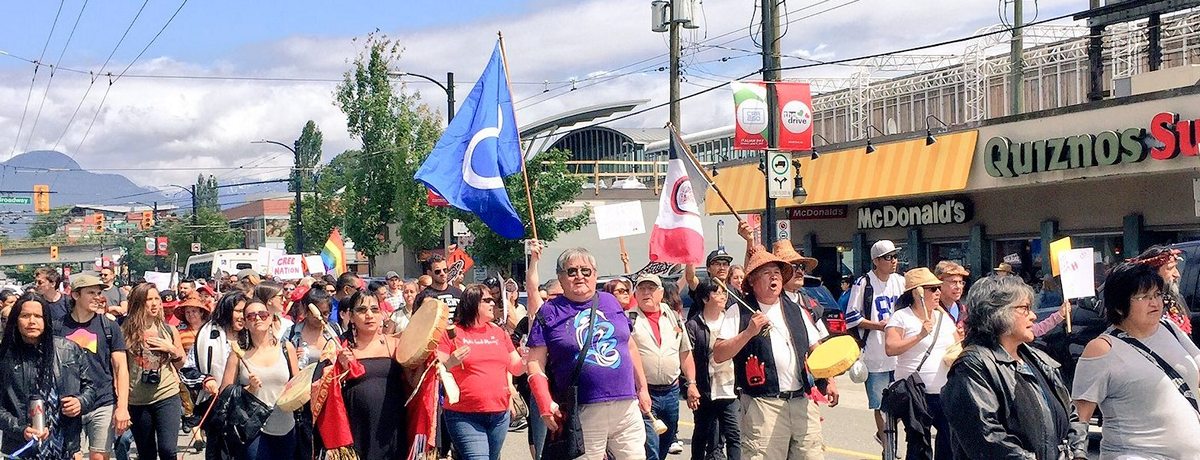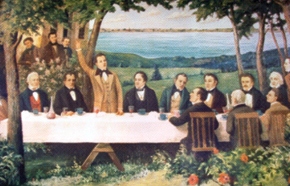
|
June 23, 2017 Quebec's National Day and Summer
Solstice Days of Celebration and Reflection
Quebec's
National
Day
and
Summer
Solstice
on the Eve of Canada 150 Quebec's National Day and Summer Solstice on the Eve of Canada 150 Days of Celebration and Reflection
|
|
|
This aim is worth recalling today, when the police powers of the state are reverting to what they were when the British drowned the nascent Quebec nation in blood in 1837-38. From this suppression the British created what are called democratic institutions in which the same police powers defined rights and the electoral process which deprives the people of power to govern themselves to this day.
The patriot Ludger Duvernay was the publisher and editor of the patriot newspaper La Minerve. Under his guidance, the Society he founded organized a banquet on June 24, 1834 in the garden of the lawyer MacDonnell to institute a national celebration for Canadiens of all origins (today, the term Quebeckers is used). It was the first celebration of the people of the nascent Quebec nation, in which Duvernay, the Patriots, their elected representatives and their party recognized the people as "the primary source of all legitimate authority," and in doing so also recognized their sovereignty.
This national celebration established by Duvernay and the elected members of the Patriot Party fell on the same date as Saint-Jean-Baptiste Day but was not the same. In fact, Saint-Jean-Baptiste Day had been introduced long before by the King of France and the Catholic high clergy in the colonies of the French empire in opposition to the June 21 summer solstice celebrated by the Indigenous peoples.
The Church, through the Council of Trent (1545-1563), attempted to Christianize the solstice celebration -- a celebration of light around a joyous bonfire -- by replacing it with a portrayal of submission in the person of Saint John the Baptist, "the lamb of God." In the same vein, in 1702, Monseigneur de Saint-Vallier in his Catechism for the Diocese of Quebec, intended for the Canadiens, noted that the Catholic Church in the New World (i.e. the colonies of the French empire) considered that ceremony acceptable so long as the "dances and superstitions" of the Natives were banished. It was not until 1908 that Pope Pius X -- advocating the division of the Canadian people into so-called French Canadians and English Canadians, which the British empire was so determined to impose -- named Saint John the Baptist as the patron saint of "French Canadians." Sixty years later, on June 24, 1968 and 1969, at a time the resurgence of Quebec's movement for independence and people's sovereignty was in full swing, this symbol of division and submission was swept aside and, once again, the National Celebration saw the people joyfully dancing around a bonfire.
 The celebration of the
National Day of the people of Quebec includes the celebration of the
Patriots, who fought for independence from Britain in the mid-19th
century and to establish an independent homeland and
republic which vests sovereignty in the
people: Nelson, De
Lorimier, Côté, Chénier, Duvernay and O'Callaghan,
amongst others. It includes celebrating all those who have espoused and
continue to espouse the cause of the Quebec Patriots, in particular all
those committed to elaborating a nation-building
project commensurate with the needs of the times.
The celebration of the
National Day of the people of Quebec includes the celebration of the
Patriots, who fought for independence from Britain in the mid-19th
century and to establish an independent homeland and
republic which vests sovereignty in the
people: Nelson, De
Lorimier, Côté, Chénier, Duvernay and O'Callaghan,
amongst others. It includes celebrating all those who have espoused and
continue to espouse the cause of the Quebec Patriots, in particular all
those committed to elaborating a nation-building
project commensurate with the needs of the times.

Quebec National Day, Montreal, June 24, 2012
Quebec Government Presents
"Policy on Quebec Affirmation and Canadian Relations"
Rehash of the Meech Lake Accord --
From Tragedy to Farce
On June 1, the Couillard Liberal government of Quebec
announced its "Policy on Quebec Affirmation and Canadian Relations."
This so-called new policy is a rehash of Bourassa's "renewed
federalism" from 30 years ago. It serves no purpose other than to
reinforce the status quo whereby Quebec is integrated into the
Anglo-Canadian state institutions which deprive the people of their
right to govern. Despite this, the Couillard government claims it has
invented the "first-ever such policy" and that its aim is to ''affirm
Quebec's nationhood and its complete expression on the Canadian scene."
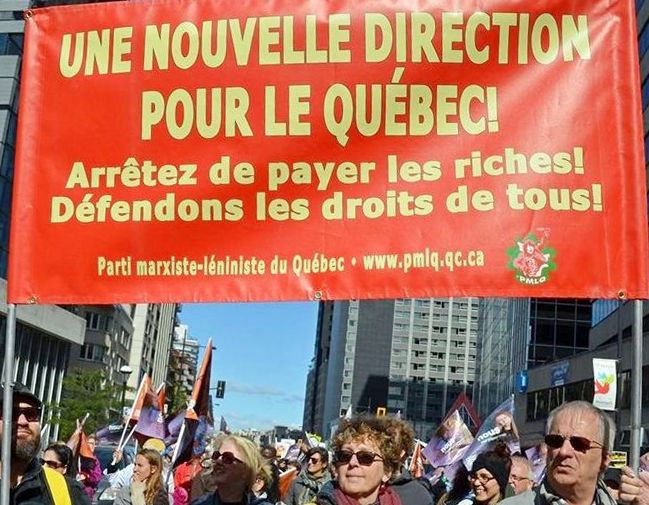 The essence of the policy is to
claim that by being Quebeckers, we express what it means to be
Canadian. The government says the policy will be carried out in two
stages. First would come a period of ''dialogue'' with civil society
institutions in Quebec and in Canada to promote ''Quebec's national
character'' as well as Quebec's contribution to Canadian Confederation.
This dialogue period would be followed by a reopening of constitutional
talks between Quebec, the provinces and the federal government with
the aim of adopting the demands put forward by the Quebec government at
the time of the Meech Lake Accord.
The essence of the policy is to
claim that by being Quebeckers, we express what it means to be
Canadian. The government says the policy will be carried out in two
stages. First would come a period of ''dialogue'' with civil society
institutions in Quebec and in Canada to promote ''Quebec's national
character'' as well as Quebec's contribution to Canadian Confederation.
This dialogue period would be followed by a reopening of constitutional
talks between Quebec, the provinces and the federal government with
the aim of adopting the demands put forward by the Quebec government at
the time of the Meech Lake Accord.
The Meech Lake Accord set the stage for a tragedy for the people in
which constitutional changes would be decided in secret and imposed by
the rulers to serve their own interests, without the people playing any
role. It was blocked at the last minute on June 22, 1990 by Indigenous
Manitoba MLA Elijah Harper, leading to a political crisis for the
ruling elite and their system. Lest Couillard forget, the Meech Lake
Accord failed, but this does not stop his government from trying to
repeat history, this time as farce.
Prime Minister Trudeau poured water on the entire thing before it even
got off the ground. At a press conference in La Malbaie on June 8,
Trudeau dismissed it saying, ''I am proud of this reflection which
makes us reflect on how Quebeckers can feel even more at home within
the country.'' This does not require constitutional talks, he said. "We
are not opening the Constitution," Trudeau said.
Meanwhile, when Quebec Minister for Canadian Relations and Canadian
Francophonie Jean-Marc Fournier, announced the project, he said:
''Mr. Premier, the moment we are sharing today marks an important stage
in the history of our nation, and will give our Canadian relations new
momentum.
''I am a Quebecker, and proud of it.
''I am a Quebecker and it is my way of being Canadian.
''This expression contains, in a nutshell, the meaning and essence of
Quebec's participation in the Canadian Federation since its inception.
''It expresses a plurality of ways of belonging that characterizes our
identity.
''An allegiance to Quebec and a sense of belonging to Canada.''
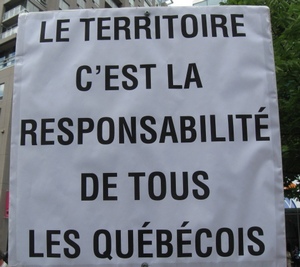 Whatever can be made of this
mish-mash on belonging and identity and ''our way of being Canadian,''
it is as clear as clear can be that the Quebec government is not
dealing with the constitutional question on a modern historical basis.
Historical wrongs of Confederation and of the constitution must be
addressed by recognizing the right of Quebec to self-determination and
the hereditary rights of the Indigenous peoples and nation-to-nation
relations, and by enshrining citizenship rights on a modern basis.
Whatever can be made of this
mish-mash on belonging and identity and ''our way of being Canadian,''
it is as clear as clear can be that the Quebec government is not
dealing with the constitutional question on a modern historical basis.
Historical wrongs of Confederation and of the constitution must be
addressed by recognizing the right of Quebec to self-determination and
the hereditary rights of the Indigenous peoples and nation-to-nation
relations, and by enshrining citizenship rights on a modern basis.
This must be done by electing a constituent assembly to draft a modern
constitution based on modern principles of citizenship and rights, to
be adopted by referendum. The people must not permit the interference
of political parties and state institutions to create hysteria against
proposals which enshrine the rights of nations and vest sovereignty in
the people. On the contrary, the people must inform themselves and
discuss widely such proposals and the principles involved. The current
institutions, which are called democratic but are based on "reasonable
accommodation" and subjecting people's rights to "reasonable limits"
defined by police powers are not acceptable.
So long as the Quebec government does not handle the matter from the
perspective of righting historical wrongs in a manner consistent with
the requirements of the times, but persists in pushing narrow and
self-serving motives, this initiative will fall on its face. One thing
is certain; No Quebec government has the right or mandate to sign the
''patriated'' anti-people Constitution of 1982 behind the backs of the
people. Couillard would do well to refrain from entertaining any such
thought.
(Online newspaper of the Marxist-Leninist Party of Quebec)
June 23 -- 27th Anniversary of Defeat of Meech Lake Accord
Canada's Existential Crisis on the Eve of
Canada 150 Celebrations
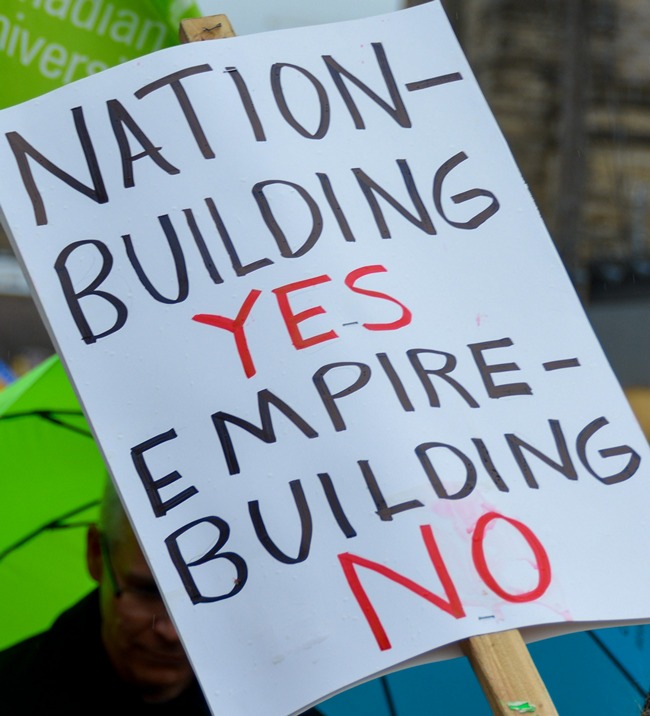 On June 23, 1990, the
ignominious Meech Lake Accord was defeated. The Meech Lake Accord was a
set of amendments to the Constitution of Canada negotiated in 1987 by
Prime
Minister Brian Mulroney and the provincial premiers behind closed
doors. The failure of the Meech Lake Accord marked a deepening of the
constitutional and political crises which has
continued to grow since that time. To this day, Quebec is not a
signatory to the Constitution Act 1982, the patriated version
of the Constitution. This version perpetuated the
negation of Quebec's nationhood and right to self-determination. While
it incorporated an amending formula and a Charter of Rights and
Freedoms, it maintained the status quo of
prerogative police powers which deprive the people of decision-making
power. Even now, Quebec Premier Couillard has made proposals to
negotiate
changes which would, according to him,
permit Quebec to sign the Constitution. But these changes are the same
old notions of "renewed federalism" left over from the
Bourassa era which claimed that Quebec should be
accorded "distinct society" status, which is meaningless. Justin
Trudeau dismissed his proposals outright, declaring that the
constitutional question will not be opened. Meanwhile, Trudeau is
strengthening the police powers already contained in the Constitution
and the national question continues to fester due to the all-round
neo-liberal nation-wrecking by the ruling class and
financial oligarchy which have seized power by force.
On June 23, 1990, the
ignominious Meech Lake Accord was defeated. The Meech Lake Accord was a
set of amendments to the Constitution of Canada negotiated in 1987 by
Prime
Minister Brian Mulroney and the provincial premiers behind closed
doors. The failure of the Meech Lake Accord marked a deepening of the
constitutional and political crises which has
continued to grow since that time. To this day, Quebec is not a
signatory to the Constitution Act 1982, the patriated version
of the Constitution. This version perpetuated the
negation of Quebec's nationhood and right to self-determination. While
it incorporated an amending formula and a Charter of Rights and
Freedoms, it maintained the status quo of
prerogative police powers which deprive the people of decision-making
power. Even now, Quebec Premier Couillard has made proposals to
negotiate
changes which would, according to him,
permit Quebec to sign the Constitution. But these changes are the same
old notions of "renewed federalism" left over from the
Bourassa era which claimed that Quebec should be
accorded "distinct society" status, which is meaningless. Justin
Trudeau dismissed his proposals outright, declaring that the
constitutional question will not be opened. Meanwhile, Trudeau is
strengthening the police powers already contained in the Constitution
and the national question continues to fester due to the all-round
neo-liberal nation-wrecking by the ruling class and
financial oligarchy which have seized power by force.
The issues that remained outstanding when the Meech Lake Accord collapsed have become more significant than ever. The existence of Quebec as a nation and its right to self-determination, as well as the hereditary rights of the Indigenous peoples continue to be denied. Furthermore, citizenship rights are reduced to privileges which are given and taken away by police powers outside the rule of law. Meanwhile, on the eve of the celebration to mark the 150th anniversary of the declaration by Royal Proclamation of the British North America Act, 1867, the ruling elite continue to concentrate economic and political power in fewer and fewer hands and integrate Canada into the United States of North American Monopolies compromising Canada's very existence as a country.
The Meech Lake Accord was reached within the context of the 1980 Quebec Referendum on the place of Quebec within Canada and the refusal of Quebec to sign onto the Pierre Elliot Trudeau government's patriated Constitution of 1982. Trudeau had promised that he would draft a new constitutional agreement after the Quebec referendum was defeated. His promise took the form of the addition of the Charter of Rights and Freedoms and an amending formula to the British North America Act, 1867, which Quebec refused to sign because it did not recognize Quebec's nationhood, as well as Section 35 which recognized "existing aboriginal and treaty rights." The British Parliament passed the Canada Act on March 29, 1982 ending Canada's formal dependence on Britain even though the Queen of England remains Canada's Head of State and the prerogative powers (police powers) are vested in the Crown.
Trudeau's Constitution Act, 1982 was the "Canadian equivalent" of Britain's Canada Act. By incorporating the text of Britain's Canada Act into the British North America Act, 1867, the Constitution was "patriated" and became the Constitution Act, 1982 even though Quebec, a founding member of Confederation in 1867, refused to sign it. In an attempt to resolve this crisis, the Mulroney government commenced constitutional negotiations in 1985, culminating with the Meech Lake Accord two years later on April 30, 1987.
 The Accord set out five main
modifications to the Constitution. They were key demands for a renewed
federalism made by Quebec Premier Robert Bourassa which he said had to
be
accepted for Quebec to sign on. In lieu of addressing the fundamental
cause of the constitutional crisis, the need to affirm the right of the
people of Quebec to self-determination, up to and
including their right to secession, and the need to make sure the
federation is a voluntary union of all its parts, the Accord deemed
Quebec to be a "distinct society." It gave Quebec a
constitutional veto, increased its powers with respect to immigration,
extended and regulated the right to reasonable financial compensation
for any province that opted out of any future
federal programs in areas of exclusive provincial jurisdiction, and
provided for provincial input in appointing senators and Supreme Court
judges.
The Accord set out five main
modifications to the Constitution. They were key demands for a renewed
federalism made by Quebec Premier Robert Bourassa which he said had to
be
accepted for Quebec to sign on. In lieu of addressing the fundamental
cause of the constitutional crisis, the need to affirm the right of the
people of Quebec to self-determination, up to and
including their right to secession, and the need to make sure the
federation is a voluntary union of all its parts, the Accord deemed
Quebec to be a "distinct society." It gave Quebec a
constitutional veto, increased its powers with respect to immigration,
extended and regulated the right to reasonable financial compensation
for any province that opted out of any future
federal programs in areas of exclusive provincial jurisdiction, and
provided for provincial input in appointing senators and Supreme Court
judges.
Because the Meech Lake Accord would have changed the Constitution's amending formula and modified the Supreme Court, all provincial and federal legislatures had to consent to it within three years. The ten provincial premiers agreed. However as the three-year deadline for consent of all legislatures drew near, the consensus began to unravel.
To try to save the agreement, a First Ministers' Conference was held 20 days before the signing deadline, resulting in an agreement for further rounds of constitutional negotiations to follow the Meech Lake Accord. During that conference, Newfoundland Premier Clyde Wells attacked the secrecy of the whole process of decision-making. On June 22, 1990, one day before the deadline, Elijah Harper, a First Nations member of the Manitoba Legislature, signalled his refusal to give his approval by holding up an eagle feather. This blocked the motion required for the Manitoba Legislature to vote on the Accord. This was followed by Clyde Wells cancelling a proposed vote in the Newfoundland Legislature, following which the Meech Lake Accord was officially dead.
A main feature of the Meech Lake Accord was its obfuscation of the status of Quebec. The Accord stated that Quebec was a "distinct society" and affirmed that the role of the Legislature and Government of Quebec was to "preserve and promote the distinct identity of Quebec." By suggesting that the key thing that makes Quebec distinct is its language (i.e. French versus English), rather than its nationhood, the issue of Quebec's inherent right to self-determination was dismissed.
The term "distinct society" remained undefined in the documents and the "distinct" features of Quebec were not enumerated, nor were any guidelines given by which these features could be preserved and promoted. "Distinct society" was subject to many interpretations, but the predominant one that emerged was the old fiction that Quebec was distinct simply because the people spoke French. By making language the only issue, the Meech formulation of a "distinct society" denied that Quebec is a sovereign nation that has historically evolved with a common economy and territory, and a culture and psychology which have the imprint of this development. Further, it denied the Quebec people the right of self-determination.
 Another significant feature
of the Meech Lake Accord was its overall promotion of national disunity
and
inequality. Defining a nation by language alone leads to the theory
that Canada is divided
into two official languages and two official cultures which are
superior and all others have to give way to them in order to be
"Canadian." The multicultural dimension is an offshoot of the
denial of citizenship rights in favour of privileges conferred by the
Crown (i.e. the police power). It permits other languages and cultures
so long as what the police powers deem to be
Canadian values and what it allegedly means to be Canadian are not
affected.
Another significant feature
of the Meech Lake Accord was its overall promotion of national disunity
and
inequality. Defining a nation by language alone leads to the theory
that Canada is divided
into two official languages and two official cultures which are
superior and all others have to give way to them in order to be
"Canadian." The multicultural dimension is an offshoot of the
denial of citizenship rights in favour of privileges conferred by the
Crown (i.e. the police power). It permits other languages and cultures
so long as what the police powers deem to be
Canadian values and what it allegedly means to be Canadian are not
affected.
Meech Lake also created disunity by devolving federal powers to the provinces, suggesting the existence of ten small nations (the provinces) and one big one, the federal government. The two territories (Nunavut did not yet exist) were not invited to Meech (they participated by video conference) because Mulroney considered their power insufficient to affect any decisions, implying that different regions of Canada had different statuses. Meech also gave each province a veto to block legislation and it was clear that each province would use its veto to promote the narrow interests of its own regional economic and political power brokers rather than to advance the overall national interests.
A third main feature of the Meech Lake Accord was its failure to affirm or even address the hereditary rights of the Indigenous peoples, which amounted to a suppression of those rights. The rights of the Indigenous peoples are not a peripheral issue but should be provided with a guarantee in the Constitution of Canada. They have a rightful claim to the land of their ancestors and to the determination of what must be done with it. As sovereign peoples they have the right to determine not only their affairs but participate in determining the affairs of Canada as a whole. In the proposed modifications to the Constitution, the Meech Lake Accord did not deal with any of this. Indigenous leaders also raised two other issues. One was their exclusion from the entire Meech proceedings. The other was the potential transfer of federal services to the provinces implied by the clause calling for compensation to provinces for opting out of federal programs. This could lead to the dismantling of programs very important to the well-being of Aboriginal peoples, they pointed out.

A fourth main feature of Meech Lake was the anti-democratic nature of the proceedings. All consultations were held behind the backs of the people. In fact, people referred to the process as eleven white men in suits dealing with the future of the country behind closed doors.
Once the Meech Lake agreement was reached in secret, the eleven first ministers then tried to impose it on the people without any discussion or deliberation. There was no broad consultation with the people at any time; the agenda was not set according to what the people wanted; the items discussed and included in the Accord were only those that the first ministers wanted.
The people's extreme displeasure with the Meech proceedings was captured by the 1990 Citizens' Forum on National Unity, commonly referred to as the Spicer Commission, which Mulroney was forced to convene just after the Meech Lake Accord was defeated, claiming that his government wanted to hear the opinions of Canadians. The Spicer Commission published its findings in 1991 with many Canadians expressing their acute awareness that something was lacking in the Canadian political process, that politicians were not to be trusted, and that mechanisms were required to empower the people. Many called for the formation of a constituent assembly which would enable the people to deliberate and decide on their own constitution.
Today the significance of
Meech Lake is that in this era the people want to be the arbiters and
decision-makers. CPC(M-L) pointed out at the time of the Spicer
Commission that a
form of political power has emerged in Canada with absolute power
resting in the hands of the financial oligarchs and their political
representatives. The Meech Lake Accord reflected this
by suggesting that the Prime Minister and the ten provincial premiers
should be the only ones to propose amendments to the Constitution and
that the people should be excluded from the
process. This has now become many times worse as the police powers
which are by definition above the rule of law are made "legal." This
shows the crisis in which Canada's rule of law is
mired.
The people rejected Meech because the times demand that power be transferred to the people acting in their own interests. People want to take politics out of the hands of the vested interests and place them in the hands of those who will deal with the real problems that the people face, such as the economic insecurity that is the number one worry and the deepest concern of the people.
The failure of the Meech Lake Accord also led to the eventual demise of the parliamentary configuration of the Liberal and Conservative "party-in-power" and "party-in-opposition," with the virtual decimation of the Conservatives in 1993. Despite the merger of the Reform Party and the old Progressive Conservative Party which finally achieved a Conservative Party majority under Stephen Harper, the disequilibrium which set in at that time has not re-established a two-party system but, on the contrary, imposed a mafia-style cartel party system on the polity. This has exacerbated the political crisis caused by the unrepresentative nature of the representative democracy and the fact that the electoral process is designed to deprive the citizenry of power.
Since Meech Lake, as predicted by CPC(M-L), the Liberal Party also spiralled into disrepute, beginning with the Sponsorship Scandal in 2006, through to the shenanigans of the current Trudeau government. Today, the arrogance, secrecy and corruption of the government has far surpassed that of the Progressive Conservatives who were dethroned in the 1993 election. The corruption of the party system has continually become more pronounced. Since the Sponsorship Scandal rocked the very foundations of the party system in 2006, the Harper Conservatives more than rivaled the Liberals for electoral corruption, patronage appointments, closure of debate in Parliament, and anti-people measures and now the Trudeau government has outdone the Harper Conservatives.
The content of the present society has surpassed current political forms and their constitutional underpinning. Even the continuation of the status quo, which has posed such dangers to the well-being of the people and threatened their freedoms and liberties, has now become a new regime where the concentration of power in the hands of the most financially powerful has reached levels not seen before. It has given rise to the present situation where private interests called oligopolies are given political positions and the state funds and power are openly used to support them and they openly carry out the anti-social offensive with impunity against the interests of the people. The Harper government routinely attacked public right and invoked convoluted irrational arguments to claim that the most nefarious activities were "Canadian values" and that anyone who did not espouse such things is an enemy of the state. Now the Trudeau government is openly establishing a government of police powers and calling it a government of laws. All aspects of the public authority which constituted a civil society have been forsaken in favour of the police powers.
Democratic renewal is the order of the day. Canada needs
a modern constitution written by the people. Confederation in 1867 and
everything that has followed it, including the Meech Lake Accord, are
the old project. The new project involves people taking control of
their lives. The Canadian people are educated, industrious and capable
of governing a modern society. The political power must represent not
the privileged few but all human beings who are members of the society.
Only on that basis can there be talk of equality within the body
politic.
At minimum, a modern constitution must recognize the nation of Quebec
and its right to self-determination, the hereditary rights of the
Indigenous nations and nation-to-nation relations; minority rights on
an objective, non-racist basis; gender equality; and equal rights and
duties for all in a manner which eliminates all vestiges of privilege,
racism and arbitrariness.
For a Free and Sovereign State of Quebec and an Equal Union of Sovereign Peoples

TML Daily is publishing below the position of the Marxist-Leninist Party of Quebec on the issue of Quebec sovereignty. It was originally published on the PMLQ website, www.pmlq.qc.ca.
***
|
|
The Marxist-Leninist Party of Quebec (PMLQ) was founded in 1989 with more than 1,000 members under the law governing political parties. This happened at a very important moment in the political life of Quebec, in the midst of the debate on the Meech Lake Accord that took up Robert Bourassa's proposal for renewed federalism.
The PMLQ, like many of the sovereigntist forces, had campaigned against the Meech Lake Accord because it reduced the Quebec nation to a "distinct society" and therefore did not recognize Quebec's right to self-determination. Following the failure of the Accord we wrote:
Our Party is of the opinion that with the failure of Meech Lake, it can now be said with certainty that the solution to the problems confronting the people of Quebec can no longer be sought within the confines of a constitution based upon the British North America Act. We believe that the people of Quebec need a new constitution, one which only they can decide upon without any external interference, one which is democratic and expresses the popular will and will serve the building of a future for the nation.[1]
On the issue of Quebec sovereignty, the PMLQ's position to realize a free and sovereign Quebec was clearly stated:
1. Quebec is a nation
constituted by all the people who live in its territory;
2. Quebec, as
a nation, has the right to self-determination including
secession;
3. Quebec, at this time, must exercise its right to self-determination by holding a referendum in which the people of Quebec are called upon to 1) abrogate the British North America Act and elect an assembly specifically to draft a democratic constitution; and 2) call upon the rest of Canada to do the same.[2]
It stated:
Like any nation, the Quebec nation has its inherent sovereignty, in particular its right to national self-determination including secession, if the people of Quebec so decide. For more than two hundred years the people of Quebec have been seeking precisely how this sovereignty should be expressed, how this self-determination ought to be exercised. We believe that the exercise of the right to self-determination by the Quebec people, acting as a sovereign nation, is a necessary prelude to the solution of all the other problems besetting the people, and an indispensable precondition for building a future for the nation.[3]
Beaudoin-Dobbie Report's Falsification of History Opposed
After the failure of Meech Lake, the federal government continued to seek ways to maintain the status quo with regard to Quebec by making it acceptable to the people of Quebec and the Canadian people. When the Brian Mulroney government in its final term returned the charge with the "Special Joint Committee on a Renewed Canada" (the Beaudoin-Dobbie Committee), which later prepared the Charlottetown Accord, the PMLQ reiterated that all attempts for the renewal of Canada would fail if the refusal to recognize the right of the Quebec nation to self-determination persisted:
Even though the entire document promotes the idea of a Renewed Canada, once it does not recognize the right of the nation of Quebec to self-determination, it fails. It opts for recognizing the status quo and merely takes up the problem of how to make the status quo valid for our times. The Joint Committee does this by upholding the status imposed on Quebec by the British colonialists in the Quebec Act of 1774, which it says "responded to French Canada's demands for the preservation of its laws and customs," and the Constitutional Act of 1791 which "divided Quebec into two parts corresponding to the linguistic and cultural divergence of its inhabitants." The Joint Committee correctly points out that "These two statutes acknowledged and provided the political framework for a distinct society in Quebec with institutions, laws and culture quite different from those of other political communities in North America." It goes further to point out that when the Canadian state was established through the BNA Act in 1867, it enshrined this practice of the British. The Joint Committee writes: "In 1867, Confederation recognized and re-established Quebec's distinct society as an autonomous political community while it embraced the principle of linguistic duality in the political institutions of a new country that would eventually span a continent."
Federal Referendum on the
Charlottetown Accord -- 1992
In the federal referendum on the Charlottetown Accord in 1992 -- an attempt to divide the people of Quebec with the notion that Quebec is a "distinct society" and a blatant refusal to recognize the Quebec nation and its right to self-determination -- the PMLQ actively campaigned for the No camp. During the campaign, it explained the failure of the arrangements of the empire-builders of the 19th century that the Charlottetown Accord sought to maintain in all its essentially anachronistic elements. It also published important theoretical texts on the history of the nation and political power, as well as a modern definition of rights and the distinction between citizenship and nationality.
National Campaign for a Modern Constitution and
Democratic Renewal -- September 1994
In September 1994, the PMLQ launched a national campaign for a modern constitution and democratic renewal with a series of conferences on the future of Quebec. The campaign's goal was also to not permit the political discourse to be disinformed by the false discourse of the federalists on "national unity." The PMLQ judged that the question of vesting in the people the power to decide was more important than ever. The campaign's slogan was "For a sovereign and independent state of Quebec."
Referendum on Quebec Sovereignty -- 1995
The PMLQ actively participated in the 1995 referendum campaign on Quebec sovereignty from its launch in September that year, with the slogan: "For the people's Yes!" The Party considers it played an important role in the formation of Yes Committees and it held conferences at several universities, colleges and cities to encourage everyone to participate in the referendum campaign for the Yes side.
Even before the campaign, the PMLQ organized extensive internal and external consultations on the position to take in light of the referendum question and submitted a brief to the Commission on the future of Quebec.
The PMLQ said about the referendum:
We proposed that the Preamble to the Constitution of the Republic of Quebec read in part as follows:
Conferences on the Future of Quebec -- 1998
In 1998, the PMLQ organized a series of conferences on the future of Quebec with the aim of organizing workers and youth to take up the national question. The conferences had as their theme: "The working class must constitute the nation and vest sovereignty in the people." The main challenge was not to permit the propaganda that said that the economy required integration with global markets and the abandonment of the principle of a sovereign nation-state to pass:
Today, the issue of nation-building concerns the people of the entire world. The neo-liberal offensive to sell out all the resources of nations, especially the human and natural resources, to serve the aim of making the monopolies competitive on global markets has put this issue on the agenda of the peoples everywhere. The issue is of great urgency. This concern cannot be dismissed by portraying everything to do with nation-building as an issue of separatism versus federalism or which equates separatism with sovereignty and so on, as the federal Liberals and their fellow travellers are doing. Whether or not Quebec opts for independence, the approach towards nation-building will determine the future of Quebec. Today the interests of the bourgeoisie are not identified with those of the nation. They lie in selling out all its resources, in using the state power to seize the entire social product produced by the working class to hand it over to those who invest it to make maximum profits for themselves. This is why the working class must constitute the nation and lead society so that it can advance.[8]
Opposition to Clarity Act -- 1998
When the Jean Chrétien Liberal Party, in the
context of making Canadian monopolies "number one" in the world, tried
to put an end "once and for all" to the national question
in Canada through the Clarity Act that dictated the Canadian
government's terms for holding a referendum in Quebec, the PMLQ
participated in the opposition campaign. It
published the document "Quebec Case for Sovereignty Before the Supreme
Court" in February 1998, which addresses the problem from all angles.
Harper's Motion on the Quebec Nation -- November 2006
In the wake of the Sponsorship Scandal and the defeat of the Liberal Party of Canada in Quebec, intense competition once again broke out among the political parties of the rich for the conquest of the Quebec electorate. While rejecting any discussion of the need to renew the arrangements that had their origin in the Canadian federation and choosing not to respond to the rejection of the Charlottetown Accord, they declared they had a plan to fix the problem. The reason was simple -- so long as the Quebec issue is not resolved, no political party can claim "to govern Canada from coast to coast."
Prime Minister Stephen Harper and the Conservative government joined the dance in November 2006 by filing a resolution in the House of Commons stating, "the Québécois form a nation within a united Canada." The motion passed, thwarting a long-standing strategy of the Bloc Québécois to submit resolutions to the Parliament of Canada recognizing the Quebec nation.
Harper's motion does not recognize Quebec's right to self-determination or any rights whatsoever based on the fact that Quebec is a nation in itself. First, the motion gives no power to the nation that Parliament is said to recognize. Quebec is a nation insofar as it "forms a nation within a united Canada." On the other hand, the Harper motion once again tries to establish the Quebec nation along ethnic lines, which is equally condemnable, with the deliberate goal of creating division in Quebec. Thus, the English version of the resolution reads that "the Québécois form a nation within a united Canada," which reveals the intention to cause trouble as concerns the refusal to recognize all Quebeckers as forming part of the Quebec nation so as to deny its right to self-determination.
Lawrence Cannon, Stephen Harper's former Quebec lieutenant, later gave the interpretation of the motion by declaring to reporters who asked whether the term Québécois included all Quebec residents, whatever their origin, "No. Four hundred years ago when Champlain stepped off and onto the shores of Quebec City, he of course spoke about les Canadiens. Then, as the debate evolved, we spoke of French Canadians. And in Quebec now we speak of the Québécois who occupy that land, America." This means that the Conservatives want to perpetuate divisions based on an ethnocultural basis, blocking the modern definition of the nation and the ensuing rights. It was intentional; it could be used to promote the partition of a sovereign Quebec.
These days, the PMLQ is touring Quebec to ensure that Quebec's interests are defended especially against the measures taken by the federal government, which is selling off Canada's natural resources and integrating the Canadian Armed Forces into U.S. wars of aggression.
One of the specific projects that the PMLQ takes up on a constant basis is the study of the experience of the Patriots of 1837-38 and the dissemination of Quebec history from the people's perspective, not that of the British or the federal state. The Party often brings groups of youth to the Patriots Museum in St. Charles so they may be inspired by the role that the Quebec people played at the height of the wars of independence in the Americas in the 19th century. It is also to show them that the Republic was suppressed by the British at that time, leaving no other choice but ultramontanism and liberalism, which explains the origins of the so-called reasonable accommodations of the federal government in the twentieth century, the so-called Laurier century, that are now in crisis.
The PMLQ's position is that the question of Quebec's identity should be used to unite the people to pave the way for society's progress.
Why the Working Class Must Constitute the Nation
The working class must constitute the nation because in today's world, the bourgeoisie is working to destroy the nation: it sells the nation's assets and puts its human, material and natural resources at the disposal of monopolies competing on world markets. The arrangements at the base of the 19th century nation-state have been replaced by arrangements that promote the success of the most powerful monopolies on world markets regardless of the consequences for the nation, its economy, trade and political affairs, as well as the rights of its citizens and residents.
In practice this means that major decisions about the direction of the economy are taken by private monopoly interests that have taken over the public authority. The trade agreements concluded on this basis give global monopolies the right to challenge the national public authority and destroy the national networks of public services and social programs and subordinate public right. Far from responding to people's needs on the basis of a modern definition of the rights of all in this new era, they are being redefined on a neo-liberal basis, that says society is not responsible for the well-being of its members but instead should ensure monopoly right at all times. Meanwhile, the refusal to renew the political arrangements means that the only alternative presented is to return to the old arrangements in which a hierarchy of rights is established based on national origin, race, gender and beliefs.
It is not possible to establish a nation-state in Quebec without taking into account this current reality. The question is simple: if the new arrangements do not favour the working class and the people, why would they have an interest in establishing and defending them?
The PMLQ has given the call for the working class to constitute the nation. It must do so in order to open the door for the progress of the society. This can only be achieved on the basis of modern definitions and by making modern arrangements which vest sovereignty in the people. Such arrangements will not come out of thin air. They are established in the course of the struggle to affirm the human rights of the people and the political, economic, social and cultural rights which derive from this.
The working class must take the lead to ensure that Quebec's future is not shaped by the global private monopoly interests that are leading the world toward war and economic and humanitarian disaster.
For a Free and Equal Union Between Sovereign Peoples in
Quebec, Canada and First Nations
Because of its fundamental world outlook the working class does not stop with independence. It aims to go further and establish a free and equal union between the sovereign peoples of Quebec, Canada and the First Nations. There can be no free and equal union without independence. In other words, the working class is not circumscribed in its aims. It does not consider its interests as separate from or in opposition to those of workers around the world.
The PMLQ believes that a great opportunity exists for the working class to show that it can be at the cutting edge of solving contemporary problems. Far from the paralysis and hesitation that characterizes the ruling elite and political parties that champion private interests, workers must position themselves in the van of the society to fight for democratic renewal and the exercise of power by the people. The workers should call on all the people to say Yes to self-determination and Yes to a free and equal union of the sovereign peoples of Quebec, Canada and First Nations.
Notes
1. Brief of the PMLQ National Council, November 2, 1990.
2. Ibid.
4. National Council of PMLQ, March 1992.
5. The Patriots' conception or way of thinking and
acting considered anyone fighting the
occupation, domination and oppression of our people and our country by
the British Empire as Canadian. In reality, during the years 1834-1840
there was no "French Canadian" or
"English-Canadian," except in the words and writings of Molson, McGill,
Moffatt et al. The members of the economic oligarchy, the monopolists
of the time -- the Molsons, McGills and
Moffatts -- with their supporters and their bureaucratic
administrators, organized societies that were not at all national
societies, but societies that they controlled to divide citizenship on
the
basis of national origin, language and religious beliefs. These
sectarian societies were organized in direct opposition to our
citizenship and its movement and the Patriot Party. This is why
they created at that time the St. George's Society, the St. Andrew's
Society, the St. Patrick's Society and the German Society. On January
28, 1835, these were grouped under an
umbrella organization: the Constitutional Association of Montreal,
which would establish "a paramilitary organization of the English
party," the party representing the interests of the British
Empire. On December 16, the organization took the form of the British
Rifle Corps.
7. Ibid.
8. Presentation by Christine Dandenault to the Conference on the Future of Quebec, Montreal, June 20, 1998.
Read The Marxist-Leninist
Daily
Website: www.cpcml.ca
Email: editor@cpcml.ca


